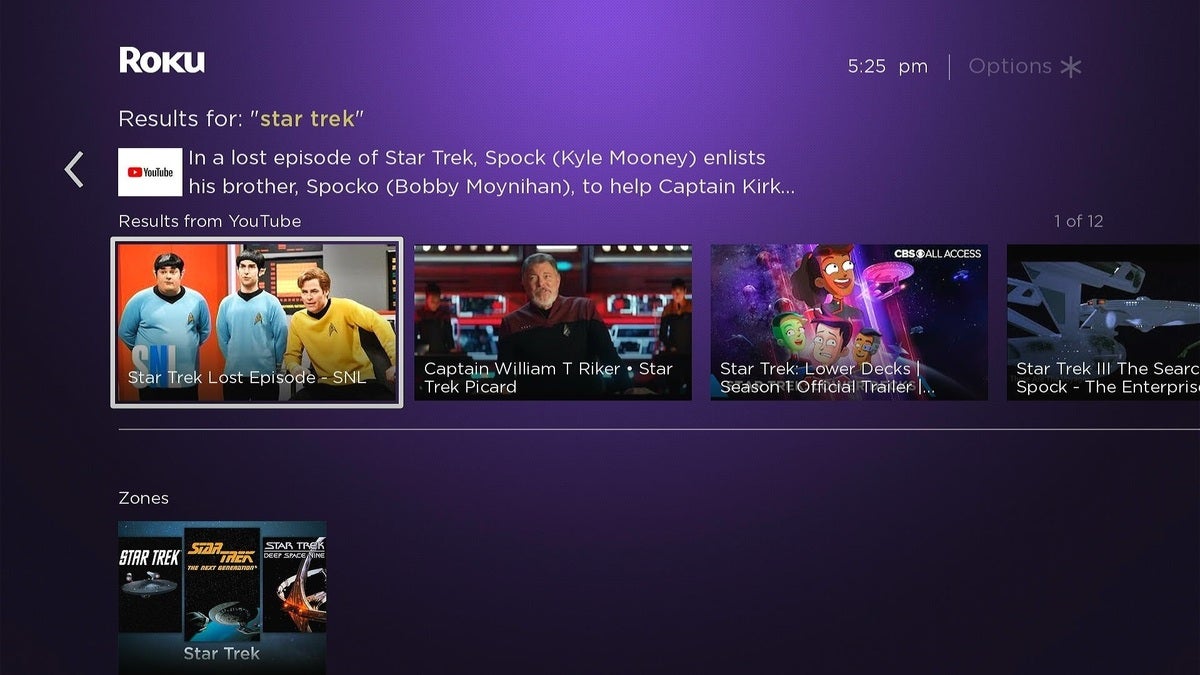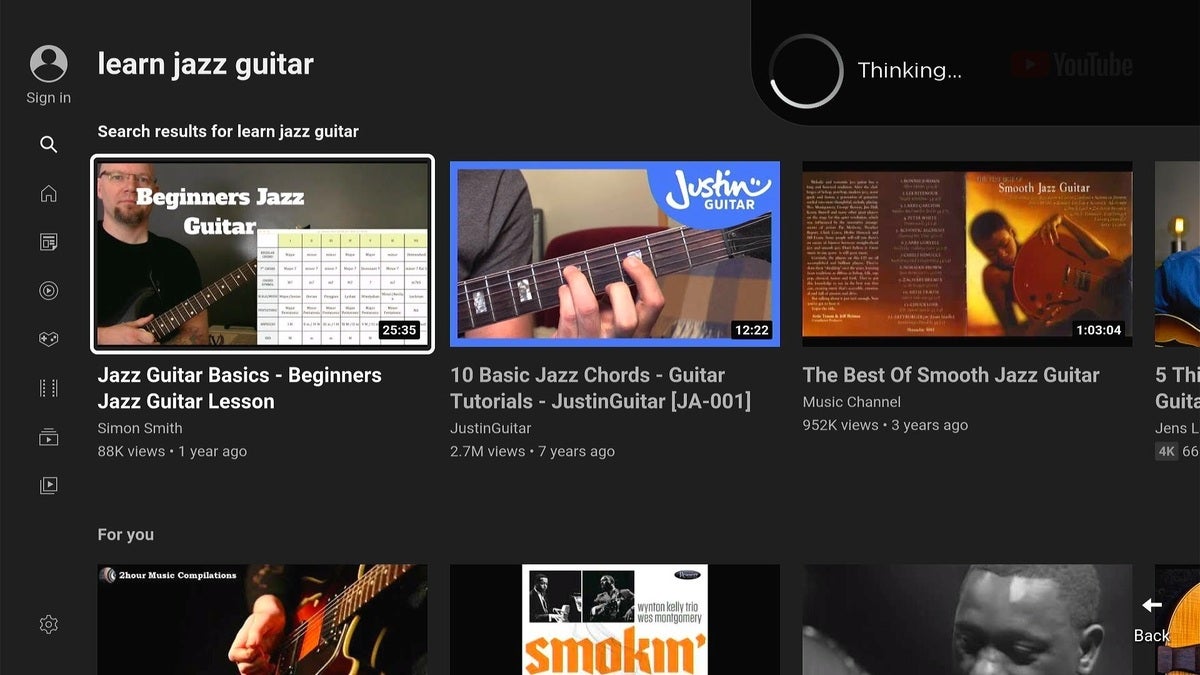About |
End the tyranny of cable!
Updated
Roku says Google is using its monopoly power to bully competitors and hurt users. If only it were that simple.

Roku, Jared Newman / IDG
Today’s Best Tech Deals
Picked by TechHive’s Editors
Top Deals On Great Products
Picked by Techconnect’s Editors
Earlier this week, some YouTube TV subscribers awoke to an alarming email from Roku, telling them that Google might take away their access to the live TV streaming service.
And that’s exactly what happened on Friday morning, at least for users who haven’t downloaded the app yet. While Roku users who already have the YouTube TV app can keep using it for now, it’s no longer available to download from Roku’s Channel Store.
In its email to customers, Roku essentially accused Google of being a bully, using anticompetitive tactics to manipulate search results, increase costs, and affect how their data is used. Roku has also been making its case to the press, describing a list of seemingly outlandish demands that Google had made as a condition of keeping YouTube TV on the platform. The ostensible goal was to create a public outrage, both among users and a government that’s increasingly wary of big tech monopolies.
Initially, I bought into it myself. But after looking more closely at Roku’s claims—and Google’s subsequent denials—it’s clear that both companies are stretching the truth to suit their own purposes. Instead of being about one company bullying another, this is really a case of two large corporations battling a petty game of inches, one in which users get jerked around the most.
Roku’s side of the story
Below is a paraphrased summary of everything Roku is claiming in this dispute—best summarized in this Axios story—along with my best attempts to suss out what’s actually happening:
Roku says: Google forced us to add a dedicated search results row for YouTube.
This appears to have already happened. Try searching for a movie or show on Roku, and if you scroll down enough, you’ll find a dedicated strip of YouTube results at the bottom.
 Jared Newman / IDG
Jared Newman / IDGYouTube gets its own row on Roku’s search results page, but you must click down a few times to find it.
In theory it would be bad if every video app got its own row of search results like this, but YouTube is sort of a special case in terms of the content it offers. Many of the things you search for on YouTube are unlikely to show up elsewhere; besides, the results are so out of the way I never noticed them until I consciously looked for them.
Roku says: For voice searches that start inside YouTube, Google wants to block results from other apps.
Again, Roku devices already work this way. Hit the mic button inside YouTube, and the results will be the same as if you’d typed a query in YouTube’s text search box. Also worth noting: YouTube’s app on Amazon Fire TV devices behaves the same way, so it’s not as unprecedented as Roku suggests.
The real issue may be that Roku wants to change the status quo in Roku OS 10, which will allow voice searches from inside an app to include both internal and external results. This change would be beneficial for users, and Google would be wrong to protest it; but in this case, Roku is the one doing the meddling.
 Jared Newman / IDG
Jared Newman / IDGUsing voice search inside YouTube already takes you to a YouTube-specific results page, both on Roku and Fire TV devices.
Roku says: Google wants YouTube Music to get top billing for music-related voice searches in YouTube, even if users have set another music app as their default.
This sounds like a petty move on Google’s part, though it’s worth noting that Roku’s default music settings are extremely limited right now. You can only change your defaults through Roku’s website, and the only available apps are Pandora, TuneIn, and iHeartRadio. Roku should perhaps work on adding more voice-controlled music sources, like Spotify or Tidal, before turning this into a major point of contention.
Roku says: Google, which competes with us on hardware, is demanding that we use specific chipsets that are more expensive.
On its face, this claim almost seems unbelievable, but there’s a somewhat boring truth behind it. As Protocol’s Janko Roettgers reports, Google wants Roku to support AV1, a royalty-free video codec with wide industry backing from players like Netflix, Amazon, Hulu, and Google itself. In the same way that Google has conditioned 4K YouTube playback on support of its older VP9 codec, the company may be trying to strongarm companies into adopting hardware that can decode AV1.
Whether this would amount to more expensive Roku players is harder to say. I’m hardly attuned to the difference in costs between chipsets, and Roku could very well decide to eat those extra costs if it had to. After all, its business revolves around building a big audience and profiting from ad revenue, not selling hardware.
In any case, broader AV1 support is an admirable goal even if Google’s tactics are crude. By providing higher-quality streams at lower bit rates, the result would be lower data consumption and less risk of buffering. One could see why Roku would avoid dredging up the specifics.
Google’s response
Compared to Roku’s statements, the response from Google has been far more reserved. But here’s what we’ve got:
Google says: Roku often engages in “these types of tactics” while negotiating with content providers.
It’s true the Roku has been butting a lot of heads lately. Peacock took two months to land on Roku after launching last summer, and HBO Max took more than six months, largely because of disputes over how to split ad revenue. A dispute with Fox last year almost caused a Super Bowl blackout, and the Spectrum TV app has been missing from Roku’s channel store since December.
Still, this carriage dispute is not like the others. Instead of just squabbling over ad inventory, Google is meddling with more fundamental aspects of the Roku platform, such as how voice search works and what components go into its products. Painting all disputes with the same broad brush is disingenuous.
Google says: We’re not trying to interfere with search results.
Even if Roku puffed up its claims somewhat, it’s hard to believe the company is inventing them out of whole cloth. In lieu of any more specifics, I’m going to say Google isn’t being totally forthright here.
Google says: We’ve made no requests to access user data
Roku itself never got into much detail on this point, so I’m not really sure what to make of it. What I do know is that both companies are in the business of hoovering up as much data on their users as they can for the purpose of showing them targeted ads. Neither should be pointing fingers at the other for trying to get more.
Will Roku users lose YouTube TV?
As of now, the YouTube TV app remains available for existing users, and Roku says that won’t change “unless Google takes actions that require the full removal of the channel.”
I’d be surprised if that happened. Roku is the most popular streaming platform in the United States, with 38-percent market share according to Parks Associates. YouTube TV, meanwhile, is the second-most popular live TV streaming service (behind Hulu + Live TV), with more than 3 million subscribers.
The reality is that both companies need each other, and risk losing a big chunk of their respective audiences by letting negotiations fall apart. My guess is they’ll find a way to work things out despite the bitter public spat, little will noticeably change in the Roku experience, and users will only have suffered a whole bunch of unnecessary stress as a result.
This story originally published on April 29, but has been updated to reflect YouTube TV’s removal from the Roku Channel Store.
Sign up for Jared’s Cord Cutter Weekly newsletter to get this column and other cord-cutting news, insights, and deals delivered to your inbox.
Note: When you purchase something after clicking links in our articles, we may earn a small commission. Read our affiliate link policy for more details.
Jared Newman covers personal technology from his remote Cincinnati outpost. He also publishes two newsletters, Advisorator for tech advice and Cord Cutter Weekly for help with ditching cable or satellite TV.

